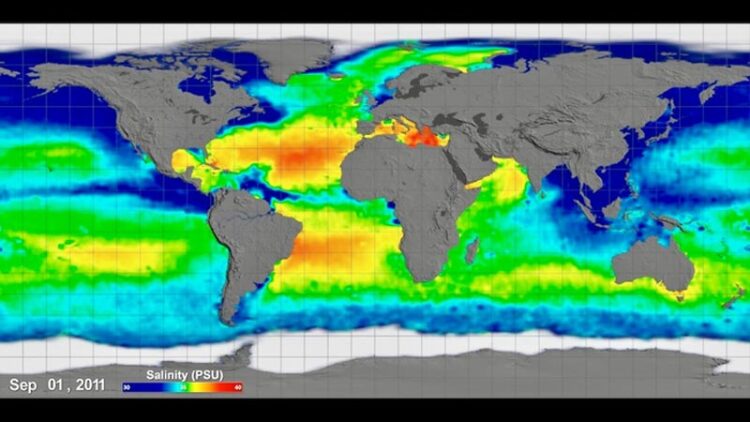Intensified water cycle slows down global warming, new study finds

Rectangular flat map projection (Atlantic-centered) with grid lines showing Sea Surface Salinity measurements taken by Aquarius space craft between September 2011 and September 2014.
Credit: NASA, Scientific Visualization Studio
Researchers found that salinity changes as a result of water cycle changes lead to less surface warming.
A new study led by scientists at the University of Miami (UM) Rosenstiel School of Marine and Atmospheric Science, in collaboration with scientists at Princeton University, shows that the intensification of global hydrological cycle drives more ocean heat uptake into the deep ocean and moderates the pace of global warming.
As a result of a warming climate, the global water cycle becomes more intensified and as a result wet regions are getting wetter and dry regions are getting drier. The researchers found that this intensification is also reflected in ocean salinity. The increase in ocean surface salinity in salty regions, such as the subtropical oceans, leads to denser seawater and more heat uptake in to the deep ocean. The increase in the rate of ocean heat uptake would reduce the rate of surface warming.
“We discovered a new mechanism that influences the rate of global warming through a suite of climate model experiments,” said Maofeng Liu, a postdoctoral researcher at the UM Rosenstiel School, Department of Atmospheric Sciences. “The good match between climate model simulations and observations in the past few decades suggest that the salinity changes due to human-induced warming are likely working to enhance the ocean heat uptake.”
To conduct the study, the researchers used a global climate model to conduct two sets of experiments. In the first set of experiments conducted as a baseline, they increased the atmospheric carbon dioxide concentration one percent per year until it doubled. In the second set of experiments, they repeated the first experiment but do not allow the surface salinity to respond to the CO2-induced global hydrological cycle changes. The different outcome from the two sets of experiments highlights the impact of the water cycle changes in the ocean heat uptake and transient climate change.
Global warming from emission of greenhouse gas into the atmosphere is increasing sea levels and resulting in more frequent and intense storms, drought, and wildfires.
“Predicting the rate of global warming is still a challenge,” said Liu. “This study found a new impact to the rate of global warming.”
The study, titled “Enhanced hydrological cycle increases ocean heat uptake and moderates transient climate change,” was published on Sep 23, 2021 in the journal Nature Climate Change. The study’s authors include: Maofeng Liu, Brian Soden and Bosong Zhang from the UM Rosenstiel School; and Gabriel Vecchi and Wenchang Yang from Princeton University.
Funding for the study was provided by National Aeronautics and Space Administration (NASA) and the U.S. Department of Energy (DOE)
About the University of Miami’s Rosenstiel School
The University of Miami is one of the largest private research institutions in the southeastern United States. The University’s mission is to provide quality education, attract and retain outstanding students, support the faculty and their research, and build an endowment for University initiatives. Founded in the 1940’s, the Rosenstiel School of Marine & Atmospheric Science has grown into one of the world’s premier marine and atmospheric research institutions. Offering dynamic interdisciplinary academics, the Rosenstiel School is dedicated to helping communities to better understand the planet, participating in the establishment of environmental policies, and aiding in the improvement of society and quality of life. For more information, visit: www.rsmas.miami.edu and Twitter @UMiamiRSMAS
Journal: Nature Climate Change
DOI: 10.1038/s41558-021-01152-0
Method of Research: Computational simulation/modeling
Subject of Research: Not applicable
Article Title: Enhanced hydrological cycle increases ocean heat uptake and moderates transient climate change
Article Publication Date: 23-Sep-2021
Media Contact
Diana Udel
University of Miami Rosenstiel School of Marine & Atmospheric Science
dudel@rsmas.miami.edu
Office: 305-421-4704
Cell: 786-256-4446
Video: Sea Surface Salinity
Media Contact
All latest news from the category: Ecology, The Environment and Conservation
This complex theme deals primarily with interactions between organisms and the environmental factors that impact them, but to a greater extent between individual inanimate environmental factors.
innovations-report offers informative reports and articles on topics such as climate protection, landscape conservation, ecological systems, wildlife and nature parks and ecosystem efficiency and balance.
Newest articles

Silicon Carbide Innovation Alliance to drive industrial-scale semiconductor work
Known for its ability to withstand extreme environments and high voltages, silicon carbide (SiC) is a semiconducting material made up of silicon and carbon atoms arranged into crystals that is…

New SPECT/CT technique shows impressive biomarker identification
…offers increased access for prostate cancer patients. A novel SPECT/CT acquisition method can accurately detect radiopharmaceutical biodistribution in a convenient manner for prostate cancer patients, opening the door for more…

How 3D printers can give robots a soft touch
Soft skin coverings and touch sensors have emerged as a promising feature for robots that are both safer and more intuitive for human interaction, but they are expensive and difficult…





















